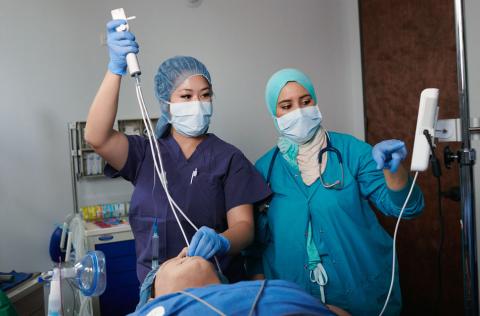The Bureau of Labor Statistics expects healthcare to be the fastest growing employment industry between 2016 and 2026, adding more jobs than any other occupational group. Additionally, if you are considering specializing in anesthesia, the country is currently experiencing a nationwide shortage of care professionals that has kept demand high. These projections are good news for you as it means increased job security as more and more fulfilling, lucrative anesthesiologist assistant positions are being created for people driven to make a difference in their communities.
As our partners at ExploreHealthCareers.org note, however, a career is more than a paycheck. It’s something you’ll be doing 40 hours a week for at least 40 years. For this reason, you should carefully consider the reasons you are choosing your career. You want to find a career path that will not only provide you access to a quickly growing industry, but also one that will lead to fulfillment.
To breakdown if the anesthesiologist assistant profession is the right path for you, consider these seven reasons for pursuing this healthcare career:
1. You can learn by reading and doing.
Many health career training programs involve both classroom lectures and hands-on learning opportunities. The Case Western Reserve University Master of Science in Anesthesia Program is no exception. Students are immersed in didactic instruction, simulation labs, and hands-on clinical training. In fact, the CWRU MSA Program gets students into the operating room within the first month of the program so that you can begin to observe and apply the concepts you are learning in the classroom to real-life situations.
2. You’ll earn a good salary.
Healthcare workers make good money. Graduates from the CWRU MSA Program in particular do well, earning starting salaries averaging $150,000 a year.
3. You’ll enjoy job security.
The healthcare field in general is growing rapidly. The U.S. Department of Labor expects healthcare to grow 18 percent from 2016 to 2026, which will result in 2.4 million new jobs. This projected growth is mainly due to an aging population, which is leading to greater demand for healthcare services and surgical care.
4. You can get to work sooner.
There are health careers that require eight, ten, or even thirteen years of specialized education after high school, but the anesthesiologist assistant profession isn’t one of them. CWRU MSA students complete their graduate school training in two years. See a breakdown between our medical training and an anesthesiologist’s medical training here.
5. You will do work that interests you.
Students are drawn to anesthesia not only because of an interest in applied pharmacology, but also because of their interests in physiology, anatomy, and physics. The anesthesiologist assistant profession also allows you to focus on anesthesia care within a specific specialty, including such as pediatrics, neurology, and trauma, and the CWRU MSA Program focuses on training within those specialty rotations in the second year. As the experts at EHC note, a career in health can lead in many directions, and the range of skills and experiences is limited only to your imagination.
6. You’ll be able to explore interests outside the operating room.
Because the profession allows for a flexible work schedule, many of our alumni are pursuing other interests outside of the operating room. Some operate small businesses. Some pursue continued education, which is often supported and funded by their employer. Many serve as clinical instructors or faculty members in anesthesiologist assistant graduate programs. Many are engaged in advocacy work through the American Society of Anesthesiologists and the American Academy of Anesthesiologist Assistants. Even more are raising families, traveling, and volunteering.
7. You’ll make a difference in people’s lives.
Surgery can’t happen without anesthesia. Anesthesiologist assistants ensure that anesthesiologists can see more patients, enable more surgeries, and save more lives every day. You will play a significant role in delivering life-saving procedures to patients in need. Ultimately, as EHC notes, you will also be helping to make our world a little healthier, safer, and better.
Learn more about the Case Western Reserve University Master of Science in Anesthesia Program or inquire today.


